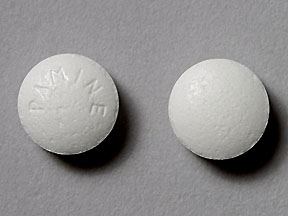Pamine
Generic name: methscopolamine [ METH-skoe-POL-a-meen ]
Brand names: Pamine, Pamine Forte
Drug class: Anticholinergics / antispasmodics
What is Pamine?
Pamine reduces the secretions of certain organs in the body, such as the stomach.
Pamine is used to reduce stomach acid secretion to help control peptic ulcers. Pamine does not help heal an ulcer.
Pamine may also be used for purposes not listed in this medication guide.
Pamine side effects
Get emergency medical help if you have signs of an allergic reaction: hives; difficult breathing; swelling of your face, lips, tongue, or throat.
Pamine may cause serious side effects. Stop using Pamine and call your doctor at once if you have:
-
painful or difficult urination;
-
little or no urination;
-
pounding heartbeats or fluttering in your chest;
-
severe diarrhea; or
-
confusion, nervousness.
Common side effects of Pamine may include:
-
headache;
-
drowsiness, dizziness;
-
blurred vision;
-
nausea, vomiting, constipation, bloating;
-
dry mouth, decreased sense of taste;
-
decreased sweating; or
-
trouble sleeping.
This is not a complete list of side effects and others may occur. Call your doctor for medical advice about side effects. You may report side effects to FDA at 1-800-FDA-1088.
Related/similar drugs
Warnings
You should not take Pamine if you have glaucoma, a bladder obstruction or other urination problems, myasthenia gravis, severe constipation, or a stomach or bowel obstruction (including paralytic ileus or toxic megacolon).
Before taking this medicine
You should not use Pamine if you are allergic to it, or if you have:
-
glaucoma;
-
bladder obstruction or other urination problems;
-
a stomach or bowel obstruction (including paralytic ileus);
-
myasthenia gravis; or
-
severe constipation, or colitis or toxic megacolon.
Tell your doctor if you have ever had:
-
heart problems;
-
liver or kidney disease;
-
a thyroid disorder; or
-
a colostomy or ileostomy.
Older adults may be more sensitive to the effects of this medicine.
It is not known whether this medicine will harm an unborn baby. Tell your doctor if you are pregnant or plan to become pregnant.
Pamine can slow breast milk production. Tell your doctor if you are breast-feeding a baby.
Pamine is not approved for use by anyone younger than 18 years old.
How should I take Pamine?
Follow all directions on your prescription label and read all medication guides or instruction sheets. Your doctor may occasionally change your dose. Use the medicine exactly as directed.
Pamine is usually taken 30 minutes before meals and at bedtime. Follow your doctor's dosing instructions.
Your doctor will need to check your progress on a regular basis.
Store at room temperature away from moisture and heat.
What happens if I miss a dose?
Take the medicine as soon as you can, but skip the missed dose if it is almost time for your next dose. Do not take two doses at one time.
What happens if I overdose?
Seek emergency medical attention or call the Poison Help line at 1-800-222-1222.
Overdose symptoms may include behavior changes, feeling restless, muscle weakness, loss of movement in any part of your body, fainting, or slowed breathing.
What should I avoid while taking Pamine?
Avoid becoming overheated or dehydrated during exercise and in hot weather. Pamine can decrease sweating and you may be more prone to heat stroke.
Pamine may cause dizziness or blurred vision and may impair your reactions. Avoid driving or hazardous activity until you know how this medicine will affect you.
Drinking alcohol with this medicine can cause side effects.
What other drugs will affect Pamine?
Pamine slows the digestive tract, which can make it harder for your body to absorb other medicines you take by mouth. Tell your doctor if any of your oral medications do not seem to work as well while you are taking this medicine.
Using Pamine with other drugs that make you drowsy can worsen this effect. Ask your doctor before using opioid medication, a sleeping pill, a muscle relaxer, or medicine for anxiety or seizures.
Tell your doctor about all your other medicines, especially:
-
atropine;
-
cold or allergy medicine that contains an antihistamine (Benadryl and others);
-
medicine to treat Parkinson's disease;
-
other medicine to treat excess stomach acid, stomach ulcer, motion sickness, or irritable bowel syndrome;
-
bladder or urinary medicines--darifenacin, fesoterodine, oxybutynin, tolterodine, solifenacin; or
-
bronchodilators--aclidinium, ipratropium, tiotropium, umeclidinium.
This list is not complete. Other drugs may affect Pamine, including prescription and over-the-counter medicines, vitamins, and herbal products. Not all possible drug interactions are listed here.
More about Pamine (methscopolamine)
- Check interactions
- Compare alternatives
- Reviews (4)
- Drug images
- Side effects
- Dosage information
- During pregnancy
- Drug class: anticholinergics/antispasmodics
- Breastfeeding
- En español
Professional resources
Other formulations
Related treatment guides
Further information
Remember, keep this and all other medicines out of the reach of children, never share your medicines with others, and use this medication only for the indication prescribed.
Always consult your healthcare provider to ensure the information displayed on this page applies to your personal circumstances.
Copyright 1996-2024 Cerner Multum, Inc. Version: 3.01.

